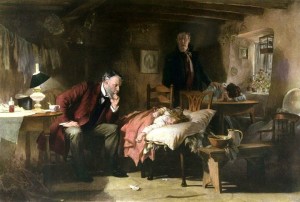Back in November, following a two-hour meeting in Chicago, president-elect Obama offered Sanjay Gupta the position of Surgeon General. (This from a presumably reliable source: Gupta’s mother, Damayanti.) Gupta has been prudently tight-lipped about the appointment ever since the Washington Post broke the story in early January.
Gupta, the chief medical correspondent for CNN, discussed the situation with his employer in mid-December. He no longer covers health policy stories for CNN, but he can still be seen on “House Call,” his weekend health and wellness feature. When a plane crashed into the Hudson, CNN called on Gupta to discuss hypothermia, and when Senator Edward Kennedy collapsed at the post-inauguration luncheon, he was similarly “pressed into duty.”
The majority of press coverage has been favorable. Ezra Klein, in a “Momma said wonk you out” column, says the 1993 Clinton healthcare reform failed because it didn’t have a media strategy. The selection of Gupta signals that the Obama administration realizes it needs “a far more sophisticated media operation.”
On the other hand, Fox News refers to Gupta as “the TV doctor,” as if he were a cast member of General Hospital. Michigan Congressman John Conyers, a strong supporter of universal health care, opposes the nomination. He’s promoting Dr. Herb Smitherman, a public health advocate from Detroit.
There’s also support for Dr. George Lundberg as Surgeon General. Lundberg, a surgeon like Gupta, was the longest-running editor of JAMA, the Journal of the American Medical Association (17 years). He was abruptly fired by the AMA when he chose to publish the research article “Would you say you ‘had sex’ if…?“, a survey on the definition of “having sex” among college students. The offense was not simply the subject, but the timing. The publication date of the article was January 20, 1999. The Monica-Lewinsky-inspired impeachment trial of President Clinton had begun on January 7. Lundberg was fired on January 15. The AMA, of course, did not cite this incident as the reason for firing Lundberg. (For those curious about the results of the survey, see the footnote below.)
Lundberg, the author of Severed Trust: Why American Medicine Hasn’t Been Fixed , has a lot to recommend him. See the extensive commentary on the post “Dr. George Lundberg for Surgeon General” on The Health Care Blog (THCB). One thing I don’t see mentioned at THCB is that Lundberg’s appointment would be a slap in the face to the AMA, assuming 10 years isn’t long enough to let bygones be bygones. Such lack of diplomacy would be highly uncharacteristic of Obama, who strikes me as a Nine on the Enneagram.
, has a lot to recommend him. See the extensive commentary on the post “Dr. George Lundberg for Surgeon General” on The Health Care Blog (THCB). One thing I don’t see mentioned at THCB is that Lundberg’s appointment would be a slap in the face to the AMA, assuming 10 years isn’t long enough to let bygones be bygones. Such lack of diplomacy would be highly uncharacteristic of Obama, who strikes me as a Nine on the Enneagram.
The Enneagram is a spiritually based personality typing system, associated with Gurdjieff, Oscar Ichazo, and Claudio Naranjo. Type Nine on the Enneagram is called the Peacemaker. Since I’m a Nine myself, my opinion on this is highly subjective.
Here’s a cartoon about the nine Enneagram types that I think illustrates how we tend to see in Obama what we value in ourselves. That’s a good quality in a leader. If Obama thinks Sanjay Gupta is the right choice for Surgeon General, I’m inclined to agree.
Barack Obama Supporters Come In All Types

Cartoons by Elizabeth Wagele
Footnote: Would you say you “had sex” if…?
The JAMA article doesn’t say this, but one conclusion you could draw from the survey of college students is that they make a distinction between sexual activity that can lead to pregnancy and behavior that leaves one technically a virgin. The research survey was done in 1991 at a midwestern college and included students from 29 states. Close to 80% considered themselves moderate to conservative politically. Sixty percent reported that what happened between President Clinton and Ms. Lewinsky does not qualify as having “had sex.”
The medical purpose of the survey was to ensure that public health officials are gathering accurate information relevant to disease transmission. The sexual activity with the greatest risk of transmitting an HIV infection did not qualify as having “had sex” for 20 percent of those surveyed. In a situation comparable to that alleged between Clinton and Lewinsky, 75 percent of students would not list the other party as a sexual partner. (This latter statistic is from a later (1996) survey.)
Sources and additional links:
(Hover over book titles for more info.)
Editor, Gupta’s Surgeon General Appointment Runs Into Opposition, The Link, January 26, 2009
Reuters, Obama offers CNN’s Gupta US surgeon general post, January 6, 2008
Brian Stelter, Still Calling Dr. Gupta, The New York Times, January 20, 2009
Ezra Klein, The Three Constituencies for Health Reform. The American Prospect, January 8, 2009
FOX News Watch, January 10, 2009
Kenneth P. Vogel, Conyers: Gupta not up to S.G. post, Yahoo! News, January 8, 2009
Stephanie A. Sanders and June Machover Reinisch, Would you say you “had sex” if…?,
JAMA 281 (3), January 20, 1999, 275-7.
George Lundberg, Severed Trust: Why American Medicine Hasn’t Been Fixed
Brian Klepper, Dr. George Lundberg for Surgeon General, The Health Care Blog, January 25, 2009.
Here’s an article that argues Obama is an Enneagram Nine with a One wing (the same as Abe Lincoln).
Barack Obama’s Enneagram Type: The Peacemaker (9w1)
Here’s a blog post that labels Obama an Enneagram Six, based on his community leadership experience, and types Michelle a One.
Here’s a site where you can peruse or join the discussion of Obama’s Enneagram type.







